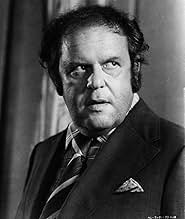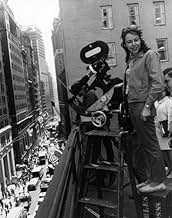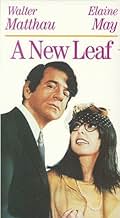NOTE IMDb
7,3/10
8,3 k
MA NOTE
Henry Graham vit la vie d'un playboy. Lorsque son avocat lui dit un jour que son train de vie a consommé tous ses fonds, il a besoin d'une idée pour éviter de descendre dans l'échelle social... Tout lireHenry Graham vit la vie d'un playboy. Lorsque son avocat lui dit un jour que son train de vie a consommé tous ses fonds, il a besoin d'une idée pour éviter de descendre dans l'échelle sociale.Henry Graham vit la vie d'un playboy. Lorsque son avocat lui dit un jour que son train de vie a consommé tous ses fonds, il a besoin d'une idée pour éviter de descendre dans l'échelle sociale.
- Réalisation
- Scénario
- Casting principal
- Récompenses
- 1 victoire et 3 nominations au total
Conrad Bain
- Professor Heinrich
- (non crédité)
Ida Berlin
- Maid
- (non crédité)
Mildred Clinton
- Mrs. Heinrich
- (non crédité)
Trent Gough
- Victor the Butler
- (non crédité)
Avis à la une
10wisaacs
This film stands up as one of the most sophisticated and heartfelt comedies ever put to celluloid. Watch it alongside "Hobson's Choice", "Hail The Conquering Hero", "The Apartment", "Shop Around The Corner", "Father Goose", "Trouble In Paradise", and "Love Streams". Although not a romance, "The Ladykillers" is a black comedy with a similar tone. See if "A New Leaf" doesn't hold up to these consensus classics.
Romance always involves the conflict between selfish vanity and naive devotion or love.
Most romantic comedies simply give up the fight at the end, and collapse into gooey, deluded sentimentality (e.g. "French Kiss", "Roxanne"). Some err in the opposite way, concluding on a bittersweet ambivalent implication that love is always dulled or compromised (e.g. "Nothing In Common", "Chasing Amy", "Purple Rose Of Cairo").
The acid test of a romantic comedy screenplay is its balance, its resolution of this issue. Can the lovers truly satisfy each other, without either one abusing or sacrificing his unique character, his intellect, his humanity?
The more starkly and intelligently these forces are presented and opposed, the more difficult the problem. Imagine, then, the most selfish, vain, sarcastic and sophisticated man imaginable, meeting and marrying (for her money) an utterly naive, pure, awkward, cloistered academic woman; a botanist.
Fans of irony enjoy silly dated romances for the stereotypes, the gratuitous sloppy honeyed sentiment, the emotional denial. "A New Leaf" does not shrink from the harsh side of the world, from the dark human character, and (except for the music) it has not dated an hour since its release.
The score may be slightly dated, mixed too high in places, but the music is sweet uptown Manhattan violin-muzak, reminiscent of "Theme From A Summer Place", so why quibble?
Henry Graham marries Henrietta Lowell intending to kill her. He is too bad to be true. Yet, his venal motives are only an exaggeration of our own. He doesn't want to be married; he wants to be free! He doesn't want to share, he wants everything for himself! He has never needed people to like him. Only now, he is desperate for money.
Henrietta, Henry's opposite, is foremost a botanist. She is a pure academic, uninitiated in the ways of sophistication, deception, vanity or power, despite her wealth. Her mind is unprejudiced, but intensely isolated, focused. She lives in a rarefied climate. Her dream in life is to discover and catalog a new species of plant, a "new leaf", which would cause her name to be modestly memorialized in the scientific literature.
These two opposites must combine in everyone. It is the problem of romance, most precisely stated. We love. We trust. Yet, we have infantile desires and vanities. We must struggle in a corrupt world that doesn't give a damn about our delicate preoccupations, to wrest from it the admiration and pleasure our dark hearts desire. We are Henry, we are Henrietta. Can these characters love each other? Can we accept, integrate ourselves?
"A New Leaf" rollicks with endlessly clever, sarcastic, inventive, trenchant dialog, reels through convoluted and finely wrought complications, revels in every character, each played by a brilliant comedian. Matthau was born to play this archetype of morbid, deranged, malevolent and dissolute urbanity. Elaine May conjures an ineffable, lethal sexiness, her myopic naivete perfectly complementing her gentle intellectual clarity. The film is an immaculate, fierce, luminous, huge-hearted gem.
Romance always involves the conflict between selfish vanity and naive devotion or love.
Most romantic comedies simply give up the fight at the end, and collapse into gooey, deluded sentimentality (e.g. "French Kiss", "Roxanne"). Some err in the opposite way, concluding on a bittersweet ambivalent implication that love is always dulled or compromised (e.g. "Nothing In Common", "Chasing Amy", "Purple Rose Of Cairo").
The acid test of a romantic comedy screenplay is its balance, its resolution of this issue. Can the lovers truly satisfy each other, without either one abusing or sacrificing his unique character, his intellect, his humanity?
The more starkly and intelligently these forces are presented and opposed, the more difficult the problem. Imagine, then, the most selfish, vain, sarcastic and sophisticated man imaginable, meeting and marrying (for her money) an utterly naive, pure, awkward, cloistered academic woman; a botanist.
Fans of irony enjoy silly dated romances for the stereotypes, the gratuitous sloppy honeyed sentiment, the emotional denial. "A New Leaf" does not shrink from the harsh side of the world, from the dark human character, and (except for the music) it has not dated an hour since its release.
The score may be slightly dated, mixed too high in places, but the music is sweet uptown Manhattan violin-muzak, reminiscent of "Theme From A Summer Place", so why quibble?
Henry Graham marries Henrietta Lowell intending to kill her. He is too bad to be true. Yet, his venal motives are only an exaggeration of our own. He doesn't want to be married; he wants to be free! He doesn't want to share, he wants everything for himself! He has never needed people to like him. Only now, he is desperate for money.
Henrietta, Henry's opposite, is foremost a botanist. She is a pure academic, uninitiated in the ways of sophistication, deception, vanity or power, despite her wealth. Her mind is unprejudiced, but intensely isolated, focused. She lives in a rarefied climate. Her dream in life is to discover and catalog a new species of plant, a "new leaf", which would cause her name to be modestly memorialized in the scientific literature.
These two opposites must combine in everyone. It is the problem of romance, most precisely stated. We love. We trust. Yet, we have infantile desires and vanities. We must struggle in a corrupt world that doesn't give a damn about our delicate preoccupations, to wrest from it the admiration and pleasure our dark hearts desire. We are Henry, we are Henrietta. Can these characters love each other? Can we accept, integrate ourselves?
"A New Leaf" rollicks with endlessly clever, sarcastic, inventive, trenchant dialog, reels through convoluted and finely wrought complications, revels in every character, each played by a brilliant comedian. Matthau was born to play this archetype of morbid, deranged, malevolent and dissolute urbanity. Elaine May conjures an ineffable, lethal sexiness, her myopic naivete perfectly complementing her gentle intellectual clarity. The film is an immaculate, fierce, luminous, huge-hearted gem.
My room mate and I love this film. We're always quoting lines from it.
"There's carbon on the valves!"
"I've achieved a sort of immortality. As a footnote and under G."
"Henrietta, you have your head in the arm hole!"
I respect Ms. May so much I feel a little guilty enjoying the film she disowned. I hope one day she will, if possible, do a "Touch Of Evil" style re-editing of the film, so that we can enjoy it as she originally intended. I guess you could say that this is my hope and my dream, which is to say that my hope and my dream are the same (my dream.)
"There's carbon on the valves!"
"I've achieved a sort of immortality. As a footnote and under G."
"Henrietta, you have your head in the arm hole!"
I respect Ms. May so much I feel a little guilty enjoying the film she disowned. I hope one day she will, if possible, do a "Touch Of Evil" style re-editing of the film, so that we can enjoy it as she originally intended. I guess you could say that this is my hope and my dream, which is to say that my hope and my dream are the same (my dream.)
Il not recount the story, as others have. The lack of response and proper public recognition for this film my be due to Elaine May's very dry wit and wry sense of humor, which, I think, simply sailed over the heads of many viewers. And it's truly most unfortunate, as this is a VERY funny film (for those who are perceptive and appreciate the subtler and darker shades of humor and life)! To the dude who rated it a "1": "A New Leaf" was nominated for 2 Golden Globes (Comedy -- Best Picture and Best Actress) and for the WGA's (the industry's official Writer's Guild -- i.e., her peers, other screenwriters) writing award for best comedy (from another medium) that year! No offense, but I value my own (and their) sensibilities a bit more than yours!! And it's impeccably acted, as others have mentioned, filled with flawless comedic timing and wry, wry wit. Simply wonderful.
One of those films which has no real highlight but which never the less leaves you feeling that you have just really enjoyed the movie. Matthau plays his roll in a way that no other could, making you feel real contempt for his character until at the last fence, he redeems himself completely. Producing and acting in the major supporting role shows the bungling and accident prone Elaine May on top form also. A real forgotten gem that is certainly worth the view.
Few people have ever even heard of "A New Leaf" and that is a shame. It is one of the funniest films in the last 30 years. Walter Matthau plays a spoiled rich man who discovers that his fortune is gone and he needs to marry in a short time to save what little he has left. His solution? Woo a rich woman, marry her, and kill her all in a week. So he picks the nerdy, klutzy, and not so attractive Elaine May (brilliant...she also wrote and directed) whose love is flowers. The film then follows Matthau as he attempts to carry out his plan. This film is full of BIG laughs and should be seen by anyone who loves a good comedy.
Le saviez-vous
- AnecdotesThe film as delivered by Elaine May was drastically re-cut and shortened ("butchered", according to some) by Paramount before its release. May sued Paramount after such drastic cuts and attempted to have her name removed from the credits, but was unsuccessful. Sadly, neither the director's cut of the film nor the original shooting script has ever been made publicly available.
- Citations
Henry Graham: Excuse me, you're not by any chance related to the Boston Hitlers?
- ConnexionsFeatured in Siskel & Ebert & the Movies: Buried Treasures - 1987 Edition (1987)
Meilleurs choix
Connectez-vous pour évaluer et suivre la liste de favoris afin de recevoir des recommandations personnalisées
Détails
- Date de sortie
- Pays d’origine
- Langues
- Aussi connu sous le nom de
- A New Leaf
- Lieux de tournage
- Oakland Gardens, Queens, New York City, New York, États-Unis(Henry drives his Ferrari from the southbound Cross Island Parkway to the eastbound Long Island Expressway)
- Sociétés de production
- Voir plus de crédits d'entreprise sur IMDbPro
Box-office
- Budget
- 4 000 000 $US (estimé)
- Montant brut mondial
- 308 $US
Contribuer à cette page
Suggérer une modification ou ajouter du contenu manquant

Lacune principale
By what name was Un nouveau départ (1971) officially released in India in English?
Répondre
































